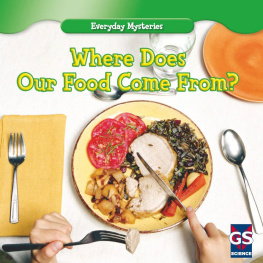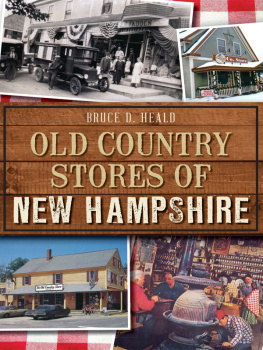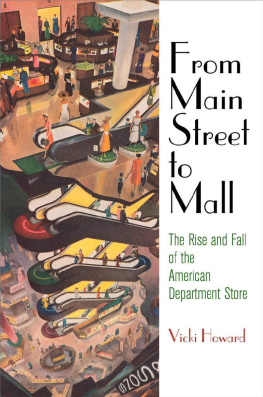CONSUMERS IN THE BUSH
McGill-Queens Rural, Wildland, and Resource Studies Series
Series editors: Colin A.M. Duncan, James Murton, and R.W. Sandwell
The Rural, Wildland, and Resource Studies Series includes monographs, thematically unified edited collections, and rare out-of-print classics. It is inspired by Canadian Papers in Rural History, Donald H. Akensons influential occasional papers series, and seeks to catalyze reconsideration of communities and places lying beyond city limits, outside centres of urban political and cultural power, and located at past and present sites of resource procurement and environmental change. Scholarly and popular interest in the environment, climate change, food, and a seemingly deepening divide between city and country, is drawing non-urban places back into the mainstream. The series seeks to present the best environmentally contextualized research on topics such as agriculture, cottage living, fishing, the gathering of wild foods, mining, power generation, and rural commerce, within and beyond Canadas borders.
1 How Agriculture Made Canada
Farming in the Nineteenth Century
Peter A. Russell
2 The Once and Future Great Lakes Country
An Ecological History
John L. Riley
3 Consumers in the Bush
Shopping in Rural Upper Canada
Douglas McCalla
CONSUMERS
IN THE
BUSH
SHOPPING IN RURAL UPPER CANADA
Douglas McCalla

McGill-Queens University Press 2015
ISBN 978-0-7735-4499-4 (cloth)
ISBN 978-0-7735-4500-7 (paper)
ISBN 978-0-7735-9709-9 (ePDF)
ISBN 978-0-7735-9710-5 (ePUB)
Legal deposit first quarter 2015
Bibliothque nationale du Qubec
Printed in Canada on acid-free paper that is 100% ancient forest free (100% post-consumer recycled), processed chlorine free
This book has been published with the help of a grant from the Canadian Federation for the Humanities and Social Sciences, through the Awards to Scholarly Publications Program, using funds provided by the Social Sciences and Humanities Research Council of Canada.
McGill-Queens University Press acknowledges the support of the Canada Council for the Arts for our publishing program. We also acknowledge the financial support of the Government of Canada through the Canada Book Fund for our publishing activities.
Library and Archives Canada Cataloguing in Publication
McCalla, Douglas, 1942-, author
Consumers in the bush : shopping in rural Upper Canada / Douglas McCalla.
Includes bibliographical references and index.
Issued in print and electronic formats.
ISBN 978-0-7735-4499-4 (bound).ISBN 978-0-7735-4500-7 (pbk.).ISBN 978-0-7735-9709-9 (ePDF).ISBN 978-0-7735-9710-5 (ePUB)
1. ConsumersOntarioHistory19th century. 2. ShoppingOntarioHistory19th century. 3. General storesOntarioHistory19th century. 4. Consumption (Economics)OntarioHistory19th century. 5. OntarioEconomic conditions19th century. 6. OntarioSocial life and customs19th century. 7. OntarioRural conditionsHistory19th century. I. Title.
HF5429.6.C32O58 2015 | 381.10971309034 | C2014-907273-2
C2014-907274-0 |
To the memory of Kazuo Kimura (19472007)
CONTENTS
1
CRUSOE IN UPPER CANADA? STORIES OF RURAL CONSUMPTION
2
PLACES, STORES, AND PEOPLE: VILLAGE STORES AND THEIR CUSTOMERS
3
FASHION IN THE COUNTRYSIDE? TEXTILE AND CLOTHING PURCHASES
4
A WORLD WITHOUT CHOCOLATE: PURCHASES OF GROCERIES AND MEDICATIONS
5
IRON IN A WOODEN AGE: HARDWARE AND RELATED PURCHASES
6
LOCAL GOODS: IMPORTERS AND THE MARKET FOR LOCAL PRODUCTS
7
HOUSEHOLD GOODS, FOOTWEAR, AND OTHER PURCHASES
ILLUSTRATIONS
TABLES
APPENDICES
ACKNOWLEDGMENTS
I am delighted to acknowledge obligations accumulated in writing this book. Initial funding for the research was provided by grants from the Social Sciences and Humanities Research Council of Canada. The program was carried forward under the auspices of a Killam Research Fellowship awarded by the Canada Council and during my tenure as Canada Research Chair in Rural History at the University of Guelph.
Laura Zink and Annette Fox were responsible for record linkage and gathered and coded the original account book data, a herculean task given the limitations of spreadsheet software then available. Subsequent checking and work with their data and the original sources have only reinforced my appreciation of their accomplishment in turning daybooks into data. I benefited also from their engagement with the larger research objectives of the project as our encounters with the evidence prompted reflection on and adjustment of initial hypotheses. Erin Stewart-Eves, Beth Yarzab, Jeralyne Manweiler, Jon Studiman, and Josh MacFadyen all provided excellent research assistance as the data posed ever-widening questions; Erin also did superb work in systematically rechecking data sets.
The work was greatly assisted in early stages by Rosemary Ommer, Robert Sweeny, and Robert Hong; their work on Newfoundland was an inspiration and their generous advice to Laura, Annette, and me was immensely helpful. Normand Sguin, Serge Courville, Jean-Claude Robert, and their colleagues at the Centre interuniversitaire dtudes qubcoises were likewise encouraging from the start. Participating in CIEQ has offered a privileged window on some of the liveliest historical scholarship I know and provided a sympathetic audience for several of my tentative explorations in consumption history. Ruth Sandwell and Colin Duncan read drafts of most of the core chapters and gave just the right kind of advice on what needed to be done with them.
Colleagues in history at Trent University and the University of Guelph likewise provided willing audiences and constructive criticism as the project developed. Catharine Wilson and Kris Inwood have been consistently supportive; I can only begin to express my gratitude for the ways in which they have sustained my commitment to the work. While visiting at Guelph, Royden Loewen was equally encouraging; his scholarly engagement has continued to provide an example to aspire to. The book could not have been written without all of this support; its flaws and limitations, however, are entirely my responsibility.
Papers from this project have been presented at CIEQ, meetings of the Canadian Network for Economic History, the Business History Conference, the Canadian Historical Association, the Department of Economics at Queens University, and the Niagara Historical Society. My thanks to all for these opportunities. Elements of the argument have appeared in the Material History Review (now the Material Culture Review), Agricultural History, and Ontario History; I am grateful to the editors of these journals and their publishers, Cape Breton University Press, the Agricultural History Society, and the Ontario Historical Society, for permission to incorporate revised versions of these essays here.
None of this would have been possible without the business accounts that sustain this study. Full credit to the Trent University Archives, Queens University Archives, and the Archives of Ontario for recognizing the promise of these materials and to staff at all three for their professionalism and for making their archives such ideal places for a historian to work.
It has been a pleasure throughout to work with McGill-Queens University Press. I owe a particular debt to Kyla Madden for her sustained engagement and support, sharp and constructive advice, and remarkable efficiency at every stage. Helen Hajnoczky has been consistently helpful and equally efficient. Claude Lalumire has been an ideal editor, very professional, and at all times a pleasure to deal with. His perceptive and patient work in addressing the intricacies of all the numbers and tables deserves special acknowledgement. Here I also thank readers for the Press for their responses to the manuscript and suggestions for improvement; if I have not always succeeded in following the latter, I nevertheless took them seriously and the book benefited greatly from the review process.
Next page








